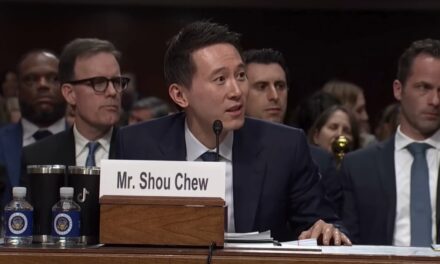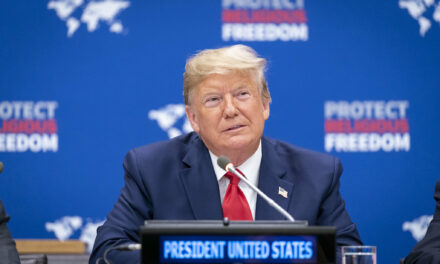We support our Publishers and Content Creators. You can view this story on their website by CLICKING HERE.
Federal Communications Commission (FCC) member Nathan Simington said that CBS’s selective editing of its “60 Minutes” interview with Vice President Kamala Harris should likely be investigated in response to allegations of news distortion.
“Our precedent provides that the Commission may investigate an intentional, substantial, and material distortion of the news, where, as arguably here alleged, ‘outtakes’ from a news segment appear to substantiate genuine concerns around ‘splicing’ answers of an interviewee,” Simington said in a statement to The Federalist. “A complaint need not fully factually prove an allegation of news distortion; it need only raise a substantial and material question of fact.”
While Simington said that the FCC should take a cautious approach to looking into CBS’s apparent distortion of Harris’s answer, he also said that the commission should take the complaint seriously and that it likely means opening an inquiry.
“The Commission is not a roving arbiter of truth. We do not second-guess genuine editorial judgment. And if the exercise of good-faith editorial judgment is ultimately all that happened, then the Commission cannot and should not act to censor or otherwise ‘punish’ a licensee,” Simington said. “The application of our news distortion policy is intentionally narrowly-specified. But that does not mean that nothing a licensee does can ever trigger it. The Commission can and should take the complaint seriously. That might, and probably does, mean opening an inquiry.”
Simington’s statement came after an organization filed a complaint with the FCC, seeking to compel CBS to release a full video or transcript of Harris’ interview with Bill Whitaker, where it appears editors removed her “word salad” answer to one question and replaced it with another more succinct one.
Simington, however, said that he is unsure that compelling the release of a transcript from CBS is within the authority of the FCC, adding, “I believe that it is within the Commission’s authority to interrogate whether a licensee has violated Commission guidelines regarding public interest as applied in the news context.”
The complaint from the Center for American Rights said the issue is deeply concerning because “the general public no longer has any confidence as to what the Vice President actually said in response to the query.”
The move to edit the Democrat presidential candidate was roundly criticized as an effort by corporate media to run defense for Harris’s inability to coherently articulate her political positions. It also has many wondering what else was edited out of the interview, as only a portion was broadcast for the American public to see.
“CBS News now stands accused of deliberately distorting its news coverage for nakedly political purposes, to prop up Kamala Harris’ flailing presidential campaign by attempting to hide her inability to answer even simple questions about her policy positions and how she would act if elected president,” Will Scharf, Of Counsel to the James Otis Law Group and an attorney for President Donald J. Trump, wrote for The Federalist.
Amid calls to release the full interview and serious questions about corruption to benefit the Harris campaign, CBS decided to release a statement Sunday where it both defended the decision and openly took a swipe at Trump — leading to further concern that the outlet is fully in the bag for Harris.
“Former President Donald Trump is accusing 60 Minutes of deceitful editing of our Oct. 7 interview with Vice President Kamala Harris. That is false,” the statement said, before asserting, “Remember, Mr. Trump pulled out of his interview with 60 Minutes and the vice president participated.”
In response to CBS’s statement, the Trump campaign said, “60 Minutes just admitted to doing exactly what President Trump accused them of doing. They edited in a different response — from another part of her answer — to make Kamala Harris sound less incoherent than she really was.”
Simington is very skeptical of the authority of the FCC, and ultimately said he hopes one day Congress will effectively dissolve the agency. However, so long as it exists, the rules executed by the FCC should be applied to any who violate them.
“Don’t get me wrong: the Commission’s application of media regulatory authority has recently been an exercise in overreach. But we are either in the media business or we are not,” Simington concluded. “If we are, and if we have acted as we have recently, we should apply our rules fairly and without favor. While I look forward to the day that Congress, so to speak, ‘takes the keys away’ from the Commission, our rules as they exist today must be applied even-handedly if they are applied at all.”
Breccan F. Thies is an elections correspondent for The Federalist. He previously covered education and culture issues for the Washington Examiner and Breitbart News. He holds a degree from the University of Virginia and is a 2022 Claremont Institute Publius Fellow. You can follow him on X: @BreccanFThies.

 Conservative
Conservative  Search
Search Trending
Trending Current News
Current News 





